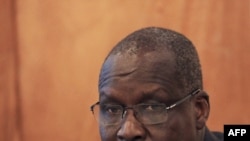South Sudan's minister for East African Affairs, John Luk Jok, died Tuesday in the capital Juba, reportedly from complications of prostate cancer. Luk was widely credited with being the mastermind of South Sudan's Transitional Constitution, adopted when the country became independent from Sudan in 2011.
Information Minister Michael Makuei described Luk as a nationalist who believed in the peaceful resolution of conflicts, even though Luk was no longer a member of the ruling SPLM party.
Luk participated in several struggles that led to the country's independence from Sudan and, more recently, helped restore peace and stability in South Sudan, according to Makuei.
"It is a great loss to the people of South Sudan, because John Luk had contributed a lot, and him and myself has done a lot in the legal sector and in the negotiations and in all aspects of governance system in South Sudan. So his death is not only a loss to the community, but a loss to the people and the government of South Sudan," Makuei told VOA's South Sudan in Focus program.
Luk served as the South Sudanese minister for East African Affairs and a member of the Former Detainees, one of the parties that signed the 2018 revitalized peace agreement.
Luk served in several positions including minister for petroleum, energy and mining. He was South Sudan's minister for justice and constitutional affairs from 2011 to 2013. Before becoming minister of East African affairs, he served as minister for transport.
Before South Sudan became a country, Luk helped draft the transitional constitution of Sudan following the signing of the Comprehensive Peace Agreement, the deal that ended the conflict between Juba and Khartoum in 2005.
Although Luk is remembered fondly by some politicians, other South Sudanese blame him for giving President Salva Kiir too much power in the transitional constitution. Under the constitution, the president is allowed to appoint and fire governors at will.
Luk split from the ruling SPLA party and its chairman, President Kiir, in 2013, joining the Former Detainees, one of South Sudan's political factions.
Despite joining the opposition, Luk remained a nationalist, according to Makuei.
"Despite the fact that he was on the other side, nevertheless he was with the government, but when we go for talks he sticks on the side of the opposition. But John Luk had ever [always] been realistic and straightforward on national issues," Makuei told VOA.
During peace negotiations between Juba and Khartoum, Luk served as a legal adviser to the late John Garang, known as the father of South Sudan.
South Sudanese politician Kosti Manibe, who was detained with Luk after the government accused both men of attempting a coup in Juba in December 2013, called Luk a meticulous politician, adding he was "always writing down whenever you are having meetings and discussions; he always kept very detailed notes of that."
Luk is believed to have been born in 1952 in Akobo, Jonglei State. He was educated at the University of Khartoum from 1974 to 1977, where he earned a law degree. He later graduated from the London School of Economics in 1983.

